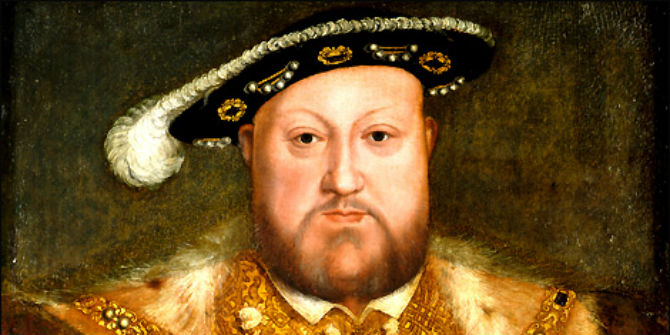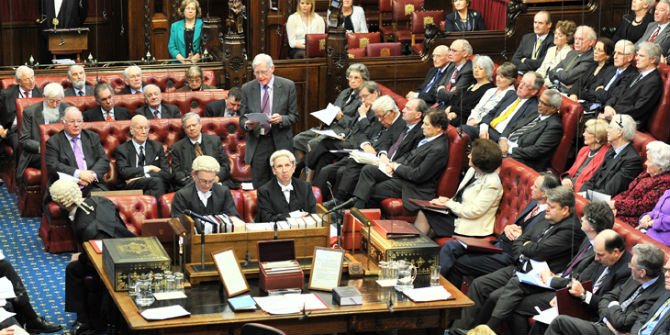 Perhaps with an eye to the departure of the Great British Bake Off from the BBC, Theresa May’s government appears to be seeking to fill the gap in the schedule. In this article, Kenneth Armstrong argues that the inclusion of a Great “British” Repeal Bill in the Queen’s Speech represents a technical challenge that voters might find difficult to digest.
Perhaps with an eye to the departure of the Great British Bake Off from the BBC, Theresa May’s government appears to be seeking to fill the gap in the schedule. In this article, Kenneth Armstrong argues that the inclusion of a Great “British” Repeal Bill in the Queen’s Speech represents a technical challenge that voters might find difficult to digest.
Timed to coincide with the start of the Conservative Party conference – and combined with Prime Minister May’s revelation that Article 50 TEU would be triggered by the end of March 2017, so beginning the UK’s process of withdrawal from the EU – the intention seems to have been to offer Brexit as an hors d’oeuvres to the conference both to get it out the way and to keep grumblings at bay. This contrasts with the approach of the Labour Party which was simply to banish Brexit to the fringes and coffee rooms, keeping it off the main conference menu altogether.
But the announcements were also showstoppers intended to fill the mouths of those urging the Prime Minister to either ignore Article 50 entirely and simply legislate for Brexit or to show some tangible evidence that Brexit does indeed mean Brexit.
The focus of the Great Repeal Bill is, of course, that 1970s favourite, the European Communities Act 1972.
The European Communities Act gives domestic effect to binding EU legal acts. Repeal the Act and the flow of EU norms into domestic law is shut off. Of course, as constitutional law expert and colleague Mark Elliott observes, once the UK leaves the EU then the UK will be cut off from the source of those norms: there will be no binding EU obligations to which to give effect in UK law.
But a future Great Repeal Act is symbolically significant and legally not unimportant. Symbolically it gives the effect of the reassertion of the sovereignty of Parliament as master of the process of permitting or denying the effects of EU law in the UK. It appeals to the sovereigntist strand of ‘taking back control’. As well as being the parallel domestic legal means of withdrawing the UK from the EU, the announcement of the legislation might also play out in the legal challenges before the UK courts which are seeking to demand that Parliament play its role in Brexit. The claim that Parliament should authorise the triggering of Article 50 TEU might seem less urgent if Parliament plays its constitutional role in repealing the 1972 Act.
Once the politicians come back from their party conferences and assemble in the big gothic tent by the Thames, they will, however, face the difficult ‘technical challenge’ that is at the heart of the Great Repeal Bill.
Despite the centrality of the word ‘repeal’ in the title, UK legislators will be asked instead to ‘preserve’ EU law in the UK from the date of withdrawal. Or as the statement from the Department for Exiting the European Union puts it: “the new Bill will convert existing EU law into domestic law”. At a policy level, the main effect to be produced is certainty and continuity with the idea being that Parliament will then decide which bits of EU law it might decide in the future to amend or repeal. But is this idea half-baked?
Like any good cake, EU law is multi-tiered. The primary law is to be found in the treaties which create mutual duties and obligations between the Member States. Section 2(1) of the European Communities Act ensures that the obligations which flow from EU membership are to be given effect in UK law. Repealing the Act would, necessarily, mean that this primary EU law would no longer reach into UK law. It is far from clear what it would mean to “convert” this into UK law post-Brexit, not least because such a legal device could not, of course, create obligations for other EU states towards the UK; that can only be achieved by whatever withdrawal and subsequent agreements might be negotiated. It would also seem paradoxical for the UK to cease to be bound by EU primary law as a matter of EU and international law, yet seek to then incorporate such law via a UK statute, thereby replicating the effect of section 2(1) of the Act which had just been repealed. Nor is it obvious that this outcome would actually be palatable to the electorate. Did voters simply express the desire that the UK cease to be a Member State of the EU or did they have something else in mind in terms of the future reach and influence of EU law?
The second tier is EU secondary law in the form of legislative and non-legislative implementing and delegated acts. If adopted as regulations, such acts can currently be directly applicable in UK law without the need for domestic rules. Repealing the 1972 Act would mean such rules would no longer have application in the UK and so the intention seems to be to domesticate these acts in UK law. What is not clear is what the mechanism will be. Will the Act merely refer nebulously to the preservation of rights and obligations under existing but unspecified EU regulations, or will the Act seek definitively to list those regulations to which its preserving effects apply?
Directives, on the other hand, are not intended to be directly applicable in national law but instead require domestic legal changes to ensure that national rules meet the requirements and aims of these directives. Transposing directives into national law can be achieved either directly by specific primary UK statute or indirectly by way of a power found in primary statutes delegating to ministers the power to adopt rules implementing EU laws. As regards the latter, the European Communities Act 1972 is a key instrument for converting EU directives into national law. Section 2(2) of the Act gives ministers powers to transpose EU instruments into national law via Orders in Council or statutory instruments under the conditions laid down in Schedule 2 to the Act.
Given that “existing EU law” in the form of directive will already have been converted into domestic law, what purpose would a Great Repeal Bill serve? The technical challenge of repealing the 1972 Act is that measures transposed into UK law via the authority of section 2(2) would no longer have a valid statutory authorisation. It is the aim of the Great Repeal Bill to ensure that there is continuing statutory authority for such acts after Brexit and after the repeal of the 1972 Act. Its aims are, therefore, entirely sensible.
The concern, however, has been expressed by commentators that the Great Repeal Act will result in a significant exercise of power by the Executive in managing post-Brexit EU law. Insofar as the aim is simply to preserve the validity of EU rules already implemented via the 1972 Act, the complaint has little traction. More significant, however, is the use of so-called Henry VIII clauses to amend UK rules over time as politicians decide to depart from the corpus of EU rules “converted” into UK law.
The irony may be that we end up with less rather than more parliamentary involvement in the post-Brexit rulebook.
There is a third level of EU law that is often overlooked and that is the detailed and practical work of implementing and applying EU rules. Particularly in areas of regulatory policy, the application of EU rules authorizing the marketing of chemicals or medicines occurs in the institutional context of EU agencies and in the practical environment of implementing guides and codes. What we have heard very little about is how UK civil servants and regulators should go about implementing EU rules as post-Brexit UK rules, with or without recourse to the interpretative, implementing and authorizing structures in which EU rules are embedded. To what extent do current guidance frameworks constitute “EU law” and to what extent should the national administrative structures continue to be involved in the application and development of such frameworks?
Topping the cake is the fourth level of interpretation of EU law given by the European Court of Justice. The May Government has been clear that the interpretative authority of the Court of Justice – to which section 3 of the 1972 Act makes express provision – is to be removed. This poses a dilemma for UK judges. If the aim is to preserve EU law in the UK unless and until politicians decide to change UK law, to what extent should UK courts follow or at least track developments in the interpretation of EU rules by EU courts to maintain consistency? Should UK judges continue to follow changes in the interpretation of EU rules unless and until ministers decide to express a view on an interpretation they do or do not wish to see reflected in UK law?
The challenges of the Great Repeal Bill are not just technical.
Indeed, the Bill may encounter resistance from other democratic quarters within the UK. The devolved parliaments and assemblies within the UK may feel that a legislative consent motion is required given the potential impact of the Bill on the exercise of devolved powers. After all, it is not just UK ministers that may exercise powers pursuant to section 2(2) of the European Communities Act 1972. To give an appropriate example, the Food Hygiene (Scotland) Regulations 2006 were adopted by Scottish Ministers under the 1972 Act to give effect to European food safety law requirements. On the one hand, repealing the 1972 Act would formally have an effect on the powers of Scottish Ministers to enact regulations implementing EU law. On the other hand, one intention behind the new Act is to preserve in law those rules which Scottish Ministers have already adopted via section 2(2). Whether or not to sign off on a legislative consent motion will be a signature challenge for the devolved parliaments and assemblies. Nonetheless, it seems clear that their verdict is not conclusive and it will be for the Westminster Parliament to decide to legislate with or without that consent.
For anyone who thought that voting Leave would cleanse the UK statute books of EU influences – and here we might recall Boris Johnson’s argument for leaving the EU that over 60% of UK laws emanated from the EU – the intentions behind the Great Repeal Bill may come as something of a surprise.
And like many a Bake Off challenge, there’s many a slip twixt a teetering tiered construction held together on the baker’s bench and its presentation to millions of eagerly watching British viewers. Stay tuned and don’t switch channels. #GBRB
This article gives the views of the author, and not the position of the Brexit blog, nor of the London School of Economics. Image credit: (CC BY 2.0).
Kenneth Armstrong is Professor of European Law at the University of Cambridge.








I think there is very little in the Treaties which could be ‘converted’ or ‘incorporated’ into UK Law – not surprisingly since the one is to establish a Union which we will no longer be a part of, and the other is to organise the functioning (etc) of this Union which we will no longer be part of. Almost all the obligations upon Member States concern their relationships one with another, so far as I can see. I had a quick skim through and found as potential contenders nothing in the TEU and in the TFEU only Article 13 on animal welfare, 16(1) on personal data, 157(1,2,4) on equal pay, and 126(1) on excessive government debt, which last the UK seems to have a partial derogation from.
Andrew